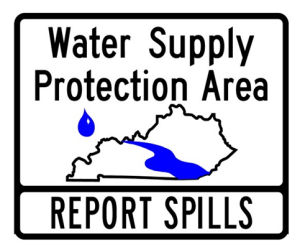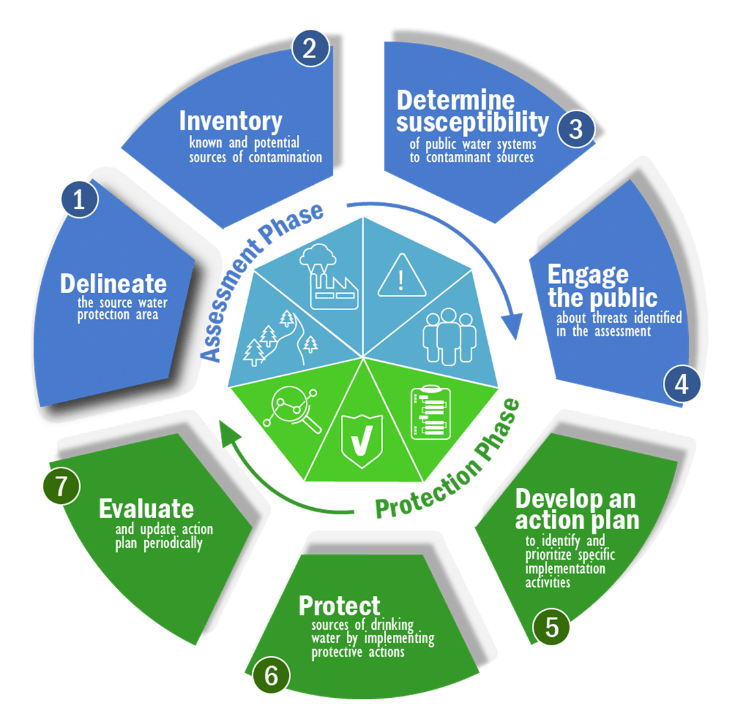Source Water Protection
What is Source Water Protection?
Source water is the raw, untreated supply of water from surface water or groundwater (such as rivers, streams, lakes, reservoirs, springs, and groundwater) that provide water to public drinking water supplies and private wells. Source water is the foundation of any drinking water utility. Drinking water utilities rely on sustainable sources of water that can be treated to provide reliable, high-quality drinking water. All drinking water sources, both public and private, are vulnerable to contamination from an array of human activities such as septic system discharges, wastewater discharges, under or above ground storage system leaks, nonpoint-source pollution, and agricultural chemicals. Without diligent attention to managing these potential contaminants, our source water will come at a higher risk and cost over time. Source water protection is simpler, less expensive, and more reliable over the long term.
Land use, droughts, floods, contamination, growth demands, population declines, emerging contaminants, and fewer allocations of water all emphasize the need to be proactive about protecting drinking water sources. A source water protection plan minimizes the potential for risk by identifying and protecting areas that contribute to both groundwater and surface water sources of drinking water. In most circumstances source water protection cannot be achieved by the drinking water utility alone, instead it takes a coordinated effort of regulatory agencies, landowners, and the public to achieve source water protection. Source water protection not only helps drinking water utilities identify their risks, but it is also necessary to educate regulatory agencies, permitting authorities, and their communities about the impacts their actions can have on source water quality or quantity. There are many additional benefits associated with source water protection, including:
- Promoting public health and safety
- Supporting economic viability
- Aligning diverse efforts for mutual benefit (conservation, regulation, planning, and/or economic development).
- Strengthening community partnerships and collaboration
Source Water Protection Programs
 Source water protection programs strive to protect sources of drinking water by developing tools and approaches or by supporting voluntary partnerships that can help prevent contamination. In Kentucky, the program is administered through the Energy and Environment Cabinet, Department of Environmental Protection at the Division of Water. The program is also a joint project with the U.S. Department of Agriculture (USDA) Farm Service Agency (FSA) and the National Rural Water Association (NRWA) built around voluntary, grassroots planning efforts that builds local responsibility and creates more sustainable communities. As part of NRWA, the Kentucky Rural Water Association (KRWA) receives a grant from the USDA, FSA to provide technical assistance to communities with source water protection.
Source water protection programs strive to protect sources of drinking water by developing tools and approaches or by supporting voluntary partnerships that can help prevent contamination. In Kentucky, the program is administered through the Energy and Environment Cabinet, Department of Environmental Protection at the Division of Water. The program is also a joint project with the U.S. Department of Agriculture (USDA) Farm Service Agency (FSA) and the National Rural Water Association (NRWA) built around voluntary, grassroots planning efforts that builds local responsibility and creates more sustainable communities. As part of NRWA, the Kentucky Rural Water Association (KRWA) receives a grant from the USDA, FSA to provide technical assistance to communities with source water protection.
The potential for contamination of drinking water, coupled with the high cost of treating water and locating and developing alternate water sources, makes it imperative that federal, state, and local entities adopt and implement effective strategies for long-term protection of drinking water sources.
Program Background
 Drinking water utilities that meet the definition of a public water system are responsible for meeting the requirements of EPA and state drinking water programs under the Safe Drinking Water Act (SDWA).The 1996 Amendments to the Safe Drinking Water Act (SDWA) established a regulatory framework for source water protection. The revised SDWA required state to develop source water assessment programs that defined source water protection area for water utilities, took inventory of potential contaminant sources, determined water utility susceptibility to contaminant sources, and provided the assessment results to the public.
Drinking water utilities that meet the definition of a public water system are responsible for meeting the requirements of EPA and state drinking water programs under the Safe Drinking Water Act (SDWA).The 1996 Amendments to the Safe Drinking Water Act (SDWA) established a regulatory framework for source water protection. The revised SDWA required state to develop source water assessment programs that defined source water protection area for water utilities, took inventory of potential contaminant sources, determined water utility susceptibility to contaminant sources, and provided the assessment results to the public.
There is no federal requirement to implement local source water protection programs based on these assessments. States take varying approaches to subsequent source water assessment and protection measures, ranging from voluntary to required surface water and/or groundwater. In Kentucky, the assessment and protection phase components have not been updated by most drinking water utilities since the original assessments more than 20 years ago, except for groundwater-based drinking water utilities.
Outcomes of a Source Water Protection Plan:
- A map outlining the source water protection area
- An inventory of potential sources of contamination and local issues of concern
- A contingency plan to ensure a safe water supply in the event of an emergency/unforeseen contamination
- Specific management strategies to address contamination concerns
- A steering committee to develop and implement the plan
- Public notification and education and outreach materials
Source Water Technical Assistance
Through KRWA, a full-time source water specialist is available to provide professional on-site technical assistance and training to local teams to coordinate and facilitate the process of developing a plan and to promote communication and collaboration between communities and government agencies. The source water specialist works with the state-based program to assist with the following:
- Developing or updating Source Water Assessments and Protection Plans
- Using geographic information systems (GIS) for analysis and development of protection zones
- Identifying actual and potential sources of contamination
- Developing source water risk assessments
- Developing source water management strategies
- Facilitating community engagement for source water planning
- Providing outreach and education about your plan and source water protection in general
- Guidance and resources in funding
- Initiate plan implementation
Hosted KRWA WHPP (Well Head Protection Plans)
Contact Us!
This program is voluntary and free of cost for drinking water utilities. Please contact us if you value a clean, high quality, drinking water supply and would like to work collaboratively with your community to develop and initiate implementation of your unique Source Water Protection Plan. This is an actionable step each drinking water utility can take to protect their drinking water sources now and into the future.
